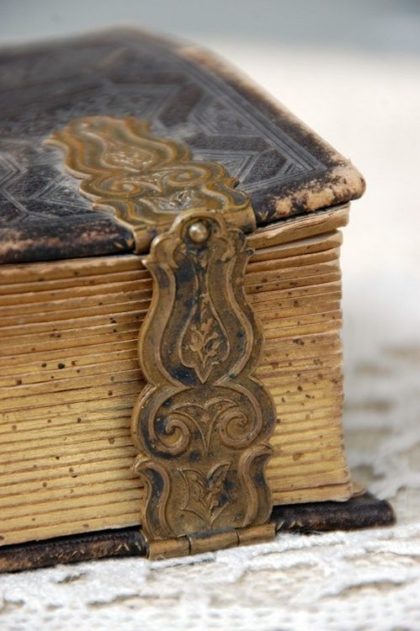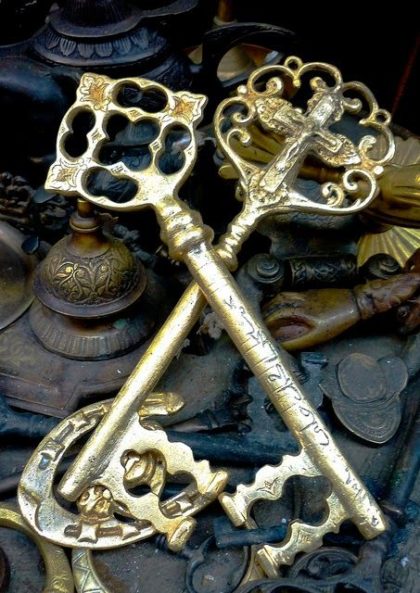Hello! My name is Stacy, and I’m one of the editors here at Book Series Recaps. I’ve been working on my YA fantasy novel The Arwyn Prophecies: Fulfilled for a little over five years, and I’m finally ready to send my book baby into the world! I’m currently searching for an agent and wanted to offer a sneak-peek to our readers, specifically to those of you interested in clean reads. I would LOVE to hear your feedback on this excerpt from Fulfilled that you can read for free below. Your comments could enable me to make adjustments that might just help me land an agent!
Chapter 1
Marcus would rather wield a dagger or shoot an arrow than wait for the effects of poison to set in, and he was a bundle of nerves because of it. He crept along the side of the little stone house. Night draped like a dark veil over this row of homes along the outskirts of the walled city. Though no one should be awake at this hour, his careful footsteps were silent on the patch of dry grass between this house and the identical one next to it.
His fingers grazed the cool stone lining the outside sill of the bedroom window as he leaned close, his ear almost touching the cracked shutters. Only the poorest in Arwyn couldn’t afford glass windows and had to suffer the summer heat and winter cold with leaky shutters, but he felt no sympathy for his targets.
Marcus held his breath and listened, expecting total silence. With any luck, the couple had succumbed to the poison while their young daughter slept in the trundle beside their bed, just as he’d observed during his many nights of surveillance. He could cover her nose and mouth with the chloroform-soaked rag in his coat pocket and steal away into the night with her, hours before any neighbors stirred.
Instead of silence, a rhythmic pattern of snores echoed on the other side of the shutter. Why hadn’t the poison taken effect? He’d slipped into the house after the family journeyed into town early that afternoon. He’d found the coffee in a clay container on a shelf by the wood stove and emptied the small vial of colorless, odorless liquid onto the beans. Later, from his perch on the sloping roof of a nearby church, he watched the couple drink their customary after-dinner coffee. They sipped it as they sat on their back stoop and smiled at their daughter as she sang and danced around their tiny yard.
Marcus had waited a full hour after the latest possible timeframe in which the poison should have done its job, yet one or maybe both of them were still breathing.
This was why he’d begged to use a different lethal method. But Marcus’s employer didn’t want anyone to suspect foul play and wouldn’t relent. His boss said the couple hadn’t lived in this city for long, had no family nearby, and kept to themselves so far. The town—even their neighbors—would soon forget them. No one would take the time to worry about or search for their daughter after their deaths, at least not for long.
In the end, Marcus was willing to do his employer’s bidding for the hefty amount of silver offered. He obtained the money as well as the name of a man who could help him with the art of subtle murder. The apothecary lived in a small, dark basement apartment at the bottom of a perilous spiral of stairs. The ancient-looking man with long white hair had assured him this poison would do the trick quickly and quietly. He said it would mimic cardian, the peculiar but deadly disease that swept through Arwyn on occasion. Whoever ingested it would be dead within four to six hours, with no outward signs of the poison.
According to the apothecary, the timing for the poison to take effect varied little from person to person, even taking into account size variations. So why hadn’t it done its job yet? Could the poison have seeped too far down in the coffee container and diluted?
Marcus’s hand hovered over the dagger at his hip, but he decided against taking matters into his own hands. If he performed the job any other way than what was assigned, his employer would demand he return the money.
So he squatted outside the bedroom window, leaned his head against the stones, and let the snores almost lull him to sleep. When the sky began to show evidence of blue-grey light, Marcus got up, stretched his aching legs, and slipped into a nearby alley to see if the family would emerge. His observations had proved they were creatures of habit. If they awoke feeling normal this morning, they head into town soon to buy sweet rolls for breakfast.
How could a family living in the poorest part of town afford to buy fancy rolls from the bakery every morning?
Sure enough, the family of three emerged right on schedule. Unfortunately, the couple still looked like the picture of health. Marcus’s stomach fluttered nervously as he followed their progress. The couple’s demise wouldn’t match the symptoms of cardian if they felt good enough to walk into town to get breakfast. Healers believed the silent killer attacked the heart as there were no outward signs of illness. The disease hit quick, usually within a few hours of the first symptoms occurring. The recipients felt like they were coming down with influenza, went to bed, and never woke up.
Marcus was grateful when they made the journey on the narrow cobbled streets to the bakery and back home again just fine. Today was Monday, so if they still felt well, then they would soon ride to the orchard just outside the city walls to purchase fresh fruit for the coming week, another extravagance Marcus didn’t understand.
He climbed to his familiar perch on the church roof to watch for the family to make another appearance. He wedged himself behind the bell tower, tugging on his collar to make sure it was in place after his ascent.
A tell like this was a dangerous habit for someone in his line of work. He tried to adjust it only when he was alone. Every once in a while he caught himself unconsciously touching it to make sure it hadn’t shifted to reveal the purplish-red patch of skin. His size, looks, and coloring were wholly forgettable, save this birthmark. If it hadn’t been in a place a collar could hide, it would’ve prevented him from pursuing this line or work.
Thankfully, the collar had stayed in place.
Marcus silently prayed the trio would make it through breakfast, to the public livery to retrieve their horse and carriage, and then beyond the city gates. If they did, he had a new plan that just might work.
He patted the second vial safely stowed in his pocket. If he could overtake them without leaving bruises or other signs of a struggle, he could put drops of poison in their eyes, an alternate faster method of transmission. He should’ve done this when he first heard the snores last night. But he kept telling himself the poisoned coffee would do the trick any minute. It never failed, according to the apothecary.
Marcus could kick himself and the apothecary right now.
If Marcus succeeded this morning, he could hide out in the woods lining the road to the orchard until evening. He could sneak the couple back into their house and their bed under the cover of darkness and finally be on his way with the girl. Marcus would need to keep her quiet with a steady stream of chloroform all day. He was pretty sure it wouldn’t harm her to stay unconscious for that long.
As Marcus adjusted to a more comfortable position, the family came outside for a second time. The assassin began a slow countdown in his head as he quickly scaled back down the roof and dropped to the ground behind the church. If the poison hadn’t acted yet, he told himself it would wait until they were out of the city and onto the quiet path to the orchard.
But did they look paler now? Were their strides sluggish? Or was it his imagination?
Marcus was now able to blend in with the late morning traffic a safe distance back. With every step he took, his confidence began to build. He thought of landmarks they needed to pass before they would be out of the bustling area. They passed each one as they walked to the livery. The woman and her daughter waited outside while the man hitched the horse to their small carriage. They climbed aboard and began the slow journey through the crowded roads.
As they came upon the last landmark, the large granite fountain just inside the city gate, Marcus allowed himself a small smile. They were almost there, almost out of the walled city. Just a few dozen feet until they were out of the gates and then a few minutes more until they made the sharp turn onto the orchard lane. He would cut through the trees lining to road to dart ahead of them and position himself to execute his new plan.
Then the unthinkable happened. As the carriage rounded the fountain, the woman slumped to the side. The man snatched the dark-headed girl out of her arms, jerked on the horse’s reins to halt its progress, and shook his wife with his free hand. His face paled with panic as he tried to wake her. Then his hands went slack, his eyes slid shut, and he slouched beside his wife. The little girl was wedged between their bodies.
Marcus picked up his pace even though it might draw unwanted attention, but the people around him had noticed the incident and weren’t paying attention to him as he darted between pedestrians.
When he was only ten paces away, two city guards clad in dark uniforms stepped around the carriage. One of them reached for the girl, who was crying.
This couldn’t be happening.
Marcus averted his face and switched directions, skirting around to the other side of the round fountain. He propped his leg on its edge and played the part of casual observer. He had a good view of the whole scene between the streams of water erupting from the center of the fountain. He was close enough to hear the whimpers of the small girl. Her blue eyes glowed with tears.
Another guard checked the man and then the woman for a pulse. He hoisted the man off the carriage, his head bobbing from side to side as the guard faltered under his weight. Once he laid him down, sprawled out on the ground below the carriage, he went around to the other side for the woman. He put his hands under her arms and began to pull her down head first, with her legs trailing behind.
Just before her feet crested the side of the carriage, a necklace fell out from under the neckline of her dress. The charm slid down her chest and came to rest on her throat before tumbling farther, its weight pulling the delicate silver chain to dangle from her neck. The guard carried the woman around the carriage and laid her beside her husband. He leaned down and carefully tugged the necklace from her neck, sliding it the length of her long, dark hair. He raised the chain in the air, the jewel swinging back and forth at eye level.
Most people’s attention shifted to a third guard who arrived and tried to calm the horse, which stamped and snorted as the crowd tightened around it. Someone to Marcus’s left took a few quick strides toward the carriage. A sideways glance told Marcus the older man’s eyes tracked the same thing to which his were glued.
The jewel was unlike anything Marcus had ever seen. A thin web of delicate silver strands encased the top half of the teardrop-shaped jewel. The casing itself was unique, but the jewel it held was exquisite. It was a rich blue color, like the deepest part of the ocean. Strands of purest green mingled with the blue. When light played on the verdant color, it gave the illusion of fog swirling beneath the jewel’s surface.
Marcus’s attention switched back to the old man for a subtle inspection. While he was dressed informally in a brown tunic and pants, he had an air of authority about him. He moved like someone who had total command of his body. Realizing a soldier or former soldier might be in his midst, Marcus decided now would be a good time to leave the scene and watch from a distance. He certainly didn’t want this man to notice him or for the guards to begin searching everyone in the area since he still had the second vial in his pocket.
Marcus’s hand trailed from his pocket to his collar as he walked away. He continued to observe as he left the scene, noting that the guard holding the necklace now gently placed it on the little girl’s neck. The old man did one last scan of the area. Whatever he saw must have satisfied him because he turned and left in the opposite direction.
Now that Marcus was ambling toward his apartment deep in the city, he allowed the internal scolding to begin. How could this have gone so wrong? Would the healers suspect cardian? Surely they would, for no other explanation would make sense. He’d been assured that no one in Arwyn had ever even heard of the poison he’d used.
With effort, he pushed aside all worries because he needed to focus on the new idea gaining traction in his mind. With no family or friends in this city, Marcus knew where this little girl would end up. He would need to send for back-up for this new plan to work.
Chapter 2
Solomon had just sat down to a late dinner at the small table by the fireplace in his room when a sharp rap sounded on his door. The visitor did not wait for an answer. A member of the king’s guard promptly slipped into the room.
“Solomon, the king would like you to join him in his library immediately.”
The old man nodded, placed his napkin on the table, and slipped leather sandals onto his knobby feet. He strode through the castle hallways and stepped into the library a few minutes later. The small rounded room was in a turret of the castle, and leather-bound volumes filled the shelves lining the walls.
The king and his prophet sat at a heavy oak table in the center of the windowless room, the only light provided by a kerosene lamp on the table. The men greeted Solomon, and the king gestured for him to have a seat. The heavy chair scraped across the stone floor, and Solomon sank onto the leather-cushioned seat.
“We’ll get right to it,” King Phillip said without preamble in his deep baritone. “Fletcher had a vision earlier this evening. It was a vision of the distant future, yet we believe action might soon be required on our part. Fletcher, please relay what you saw.”
Fletcher’s emerald eyes darted around the room but then landed on Solomon. He apparently decided to lay the worst of it out first.
“I saw our deaths,” he said. His voice was shrill compared to the king’s low timbre. “And the queen’s.”
“Our deaths?” Solomon tried to maintain a stoic composure despite his shock. “How? And when?”
Fletcher’s prophecies and those of his ancestors had helped Arwyn leaders avoid innumerable threats over the years. What they saw always came to pass unless someone took action to change the outcome predicted. Yet death prophecies had proved unalterable every single time.
“All four of us will die on the same day. On a day in which a double rainbow stretches across the Arwyn harbor.”
“How does it happen?”
“I didn’t see the act, just the aftermath, but it must be a violent death. All four of us were lying on the throne room floor, and I could see evidence of blood on our clothing. You needn’t fret right away, though, because this event takes place years in the future.”
Solomon needed to clear his throat before speaking. “How are you so sure?”
“The prince is in them and has come of age. It’s hard to tell exactly how old he is…”
“So maybe ten years from now?”
“Perhaps. Or fifteen or even twenty. Visions which reach this far into the future aren’t clear or detailed, so it’s hard to say.” Fletcher’s voice was steadier now, returning to its usual pitch and cadence. “The prince is there mourning his parents. Before King Phillip passes, he tells the prince whom he must marry.”
This didn’t seem like the most pressing information he’d heard, but Solomon tried to focus. “Is it someone we know?”
Fletcher shrugged. “This is where it gets particularly tricky. I didn’t hear the full exchange between our king and the prince. I just know the general idea of what was said. Distant visions work this way sometimes. The prince apparently has two girls to choose between, and his father has a definite opinion on who it must be. Their faces briefly flashed through my mind when the king spoke of them, but they were imprecise. I could only tell that they’re both blue-eyed girls and that one wore a silver necklace with an unusual charm. That was the only distinction I could make out between the two of them. I couldn’t hear who the king told him to choose, but Luke didn’t seem pleased.”
“Surely you know more than that.” Solomon pounded a fist on the table in frustration, causing the lamp’s flame to dance.
Fletcher shook his head mutely.
“I don’t understand how there’s anything to act on based on this vision. You’ve always told us death prophecies are unavoidable.”
“That’s quite true, but my vision also showed another visitor in the throne room, a young lady weeping over you. She hugs you and calls you Father. She says she should have called you this while you were still alive. And,” Fletcher paused, perhaps for dramatic effect, “that same silver necklace dangled from her neck.”
Solomon was stunned into silence.
“It’s the only clue we have to go on, yet neither the king nor I have ever seen this necklace or jewel before. Have you?” Fletcher pushed a piece of curling parchment across the table. “I’ve recreated it as best I can.”
King Phillip had remained silent during this exchange, watching the men with eyes made golden brown by the lamplight. He finally spoke up. “Do you know who this girl might be, Solomon? How could she possibly think of you as a father?”
Solomon’s fingers paused before picking up the parchment. His sharp mind reeled as he tried to organize his thoughts.
Was it possible he had one pupil left to teach? He’d spent years training young men in Arwyn. He was an effective instructor, taking on the most promising pupils and yielding the best warriors Arwyn had ever possessed. King Phillip had been his last pupil. Solomon retired when the king decided he didn’t want his heirs to endure the same childhood. Training young royals was the only reason Solomon would’ve stayed on as an instructor as he aged. Instead, the king kept him on as an advisor because of his valuable military experience.
Did he possess the strength and energy to train one more pupil? And how different would teaching a young lady prove if the girl from the vision became his student?
Solomon chuckled despite the tense mood in the room. “I assure you I have no love child, especially now at my age.”
Fletcher blanched, but Solomon continued without acknowledging it. “So she must be a pupil.”
Solomon finally lifted the parchment and pulled it close to the lamplight. He kept his expression neutral as he examined the drawing. Green and gold eyes surveyed him with rapt attention.
“I’ve seen this before,” he said, tapping on the drawing of the charm. The precision with which Fletcher had drawn it was admirable. How had he found a blue ink that matched the deep hue so closely, and how had he captured the swirling movement of the green? “Just a couple of days ago, actually.”
“Unbelievable,” Fletcher murmured. “Where?”
“I’m sure you both heard about the couple who died of cardian inside the city gates?”
The king and prophet both nodded, shifting the shadows cast on the wall by the lamps.
“The woman involved wore this exact necklace,” Solomon continued, gesturing at the parchment again. “I didn’t witness the incident but heard a commotion and went to investigate. Two guards had already arrived. One held a sobbing toddler. The other surveyed the man and woman to see if there was any hope of resuscitation. After removing them both from their carriage, the guard lifted a necklace from around the woman’s neck. It was easy to see it was valuable, and I wanted to make sure he didn’t pocket it. He placed the necklace on the little girl.”
King Phillip and Fletcher leaned closer with each sentence.
“I heard chatter about this incident when I was back in town yesterday,” Solomon continued. “You know how people can’t help but talk about a tragedy. The rumor is the authorities couldn’t find any next of kin for the little girl.”
“I’ll send someone to search for her at once,” the king declared.
Solomon insisted he be the one to go. The three men bent over the table to discuss where Solomon should take the girl if he found her. They made their plans, and Solomon departed soon after.
Chapter 3
Solomon hurried down the cobbled streets, along the familiar path into the main part of town. His footing was sure despite the slope of the road and the dampness of the stones. It had rained earlier in the evening, and now that night had fallen, a mist hovered in the narrow space between the buildings lining the winding street ahead of him.
Two-story buildings rose around him, many of which had businesses on the first floor and residences on the second. They had identical wood shingled roofs but were painted in a wide array of colors, giving the town a cheery feel during the day. The misty night had turned the buildings into varying shades of grey.
Solomon turned down the next street and saw the nearby sign: ARWYN ORPHANAGE. He tapped his knuckles firmly against the door several times and listened for footsteps. He wasn’t sure if anyone was up at this hour. He waited a full minute then knocked again. Just before another minute expired, someone began working the latch. The door cracked, revealing a short, plump woman in a pink robe. Grey curls peeked out from her dressing cap. She mustn’t have been asleep because her eyes were alert.
“Solomon?” Her tone was confused but friendly.
He blinked. He racked his brain, attempting to place her.
“You might not remember me, but I remember you.” Her cheeks colored to match her robe. “That is to say, we went to school together as children. I’m Betty. We sat by each other when we were in our fourth year. And seventh. I always won the spelling contests…”
“Yes, yes, of course,” Solomon responded, hoping his tone was convincing.
“Anyway, what can I do for you?” She moved aside to let Solomon enter the orphanage.
Solomon stepped into a narrow entryway with worn wooden floors and whitewashed walls. The dining room on his right contained a long, narrow table with bench seating. The office on his left held a desk and two wingback chairs. A staircase wound in front of him at the end of the entryway. Every square inch was neat and orderly.
“I’m here under the king’s orders, looking for someone. A little girl.”
“Oh yes, I know you trained the king when he was a youth and now work for him. And you still live in the palace, right? I’ve never visited, although I’m hoping this is my year to win the drawing for an invitation to the royal ball. If—”
Solomon was not used to being around women. He grew up with two sisters, but they were a quiet sort, never rambling like Betty. He wasn’t sure if it was rude to interrupt but decided to do just that.
“Since it’s so late, I won’t keep you for long,” he began. “I’m looking for a little girl who was possibly left in your care. I don’t know her name, but she has a necklace, silver with an unusual charm.”
“Caitlin? You’ve come for her? She’s only been here three days. How did the king even know she’s here?”
Solomon recited a story concocted by the king. The royal family heard of the tragedy and how the little girl had no next of kin. They knew of a family living in the countryside desperate for a child and decided to make the match. They asked for privacy in the matter. Total privacy, in fact. No one should ever know Caitlin had lived at the orphanage. Solomon was supposed to obtain all records of her short stay at the orphanage.
Betty nodded when he finished. “You can trust my discretion in the matter.”
“The king has heard of your work with the orphans of Arwyn. He’s grateful for your service and said he knows we can trust you.”
Solomon felt like he was really laying it on thick but was trying to appeal to her pride as he worked to convince her to keep this secret for the king.
Betty shook her head in amazement at the praise, a silly smile on her face.
Solomon turned a chuckle into a cough. “The girl? Caitlin, you said? Can you go wake her now? I would like to make sure we’re out of town before first light.”
“Of course.”
Betty regained her composure and scurried into the office. She returned with a few scrolls of paper. “Since Caitlin hasn’t been here long, this is everything I have on her. You can look through it while I go upstairs to get her.”
Solomon took the papers from Betty but stopped her with a hand on her arm. “Is there anything I should know about Caitlin? Anything you’ve learned in these few days that’s not in this paperwork?”
Betty glanced at his hand but then considered his questions.
“I don’t know her birthday, but she says she’s two years old. That seems about right. She seems bright, so she understands more than most children would at this age. Even though she’s young, she’s grieving. She asks about her parents often. She often looks sad when I answer her questions, but she has only cried twice.”
Solomon nodded. “That information should help her new family.”
Betty went to retrieve Caitlin from her room upstairs. Solomon leaned against the wall and glanced through the paperwork while he waited.
Betty returned shortly with a little girl in her arms. Solomon was rarely nervous, but his stomach tightened when he saw her. He usually didn’t start working with his pupils until they were three times her age.
“This must be Caitlin.”
When Caitlin heard his deep voice, she turned and fastened her eyes on him. They were the clearest blue he’d ever seen, and she had a mop of glossy dark curls. She studied him more carefully than he thought possible for such a young child. After a long moment, she reached her tiny arms out to him. His heart clenched, and he wasn’t sure what to do with this feeling.
“Well, that was easier than I thought,” Betty said as she transferred Caitlin to Solomon’s arms. “I told her she was leaving with you and that I know you and that you’re a nice man, but I didn’t expect her to be so compliant.”
Caitlin was feather light in his arms. She continued to stare at him with wide eyes. He stared right back. He realized Betty was still talking. She handed him a small brown knapsack.
“…and also a change of clothes and a small doll for her to cuddle with. I think that’s everything.”
“And the necklace?” Solomon asked. It was a good idea to keep it close because of its appearance in Fletcher’s vision.
“She’s wearing it. She refuses to let me remove it. It’s under her nightgown.”
Solomon nodded. Caitlin touched the back of her neck, presumably where the clasp rested.
“I won’t take it off, Caitlin,” he said gently and then turned back to Betty. “Will any of the children remember her?”
“I only have two other charges, and they’re both little ones. Caitlin’s the oldest of the three. Neither are old enough to remember her.”
“Is there anyone else who knows she’s here? Anyone who’s been by in the past few days?”
“No one except the guard who brought her here.”
“Perfect. The royal family appreciates you maintaining confidentiality to let this little one begin a new life. And I think you just might receive an invitation to the royal ball this year.”
Solomon winked. He had no idea what possessed him to do it. Betty looked like she might faint. He hoped she didn’t take the wink wrong way, but he didn’t have time to worry about it. Betty wrapped a woolen coat around the girl’s shoulders. She leaned in to plant a quick kiss on Caitlin’s cheek and then bid them both goodbye.
Solomon and Caitlin rode off into the night. They’d already planned on Fletcher tracking down the guards from the accident scene while Solomon retrieved Caitlin. He would visit with their commander, too. He would swear them to secrecy and give them a story to tell in the unlikely event they were ever questioned about the girl.
No one else would know Caitlin’s exact whereabouts. It seemed they were safe to start a new life together. At first, Solomon wasn’t sure this secrecy was necessary. As far as they could tell, Caitlin’s parents died of cardian. News of the incident had spread all over town, and no one had showed up to claim her in the past few days. But Fletcher said he had a feeling they should keep her hidden and keep her new whereabouts to themselves, and his intuition was rarely wrong.
Solomon hurried back to the palace. Caitlin bounced in his arms as he nearly jogged back up the stone path, through the palace gates, and to the stable to get his horse. The king ensured the saddle bags were loaded with the provisions they might need for the first few days in their new home.
The king had also sent a messenger to Eliza, Solomon’s recently widowed sister. Hopefully she would help him, at least while Caitlin was little. If she agreed, the messenger would bring her to join them at their new country home.
Solomon handed Caitlin to a stable hand while he mounted the chestnut horse. The stable boy was one more person who knew of Caitlin’s whereabouts, but the king trusted his palace staff implicitly.
Cait’s eyes were panicked until she was in his arms again. Why did she feel comfort there? Thank goodness she’d taken an instant liking to him. He tucked one hand around Cait to hold her in place and picked up the reins with the other.
“Are you ready to ride on a horse?” he asked her.
Caitlin bobbed her little head. He nudged the horse with his heels, and they rode off into the darkness.
* * * *
The following morning, knuckles rapped on Betty’s door once again. Had Solomon come back to ask more questions? Betty pulled the babies out of their high chairs, handed each of them a toy, and rushed to the door.
A young couple stood before her. The man had a short, stout build and wore brown trousers, a blue button-up shirt, and a hat. The woman wore a blue dress with brown flowers, and her dark hair was pulled from her face with a barrette on each side.
“How may I help the two of you?”
The lady looked to the man, and he addressed Betty in a formal voice. “I am Matthew, and this is my wife Edith.”
They shook hands, and Betty quickly introduced herself.
“We’re hoping to begin paperwork to adopt a child, ma’am,” the man continued.
“I see. Come on in.” She ushered them inside.
The man helped his wife over the threshold, took off his hat, and then rearranged his collar.
Betty motioned to the chairs in her office. “If you’ll have a seat, I’ll move the babies in here so I can keep an eye on them.”
Betty gathered the babies, one on each hip. With full bellies, hopefully they would be content for a while and make a good showing to this couple. Perhaps they would fall in love with the little boys’ big brown eyes or the little girls’ soft blond curls.
Betty placed the children on the rug in the office and made sure each still held their toy. The couple glanced at the babies but quickly turned their focus back to Betty.
Betty began with her standard list of questions, recording the couple’s answers in her ornate scrawl. They met every single qualification for an adoptive family. Betty could not put her finger on what it was about their appearance or their rapid responses, but something seemed off. She paused to see if they had any questions for her; maybe they would have thoughtful inquiries that would put her more at ease.
“We do have a question for you, as a matter of fact,” Edith began. “We witnessed the horrible scene here in town a few days ago and were quite taken by the little girl there. We’ve talked about adoption for years, and then seeing this little girl confirmed it was right for us.”
Betty’s palms began to sweat, but she determined not to fidget or let any sign of her nerves show. She maintained her posture and eye contact and pretended to listen attentively even as her mind raced.
Matthew continued, “We heard the rumor that she had no next of kin, so we assumed she was brought here. She’s the child we’d like to adopt. She was older than these two,” he said, gesturing to the babies on the floor. “And she had very dark hair.”
“I’m sorry to disappoint you, but there isn’t a little girl like you described living here. I haven’t had any new children arrive for several months.”
The couple continued prodding her with questions, but Betty did her job. The king had assigned her a duty, after all. And she was a very good liar when she needed to be.
* * * *
When the search at the orphanage proved fruitless, the couple tracked down and questioned the guards who were at the accident scene. Both guards swore they didn’t know what had become of the little girl. They claimed to have passed her off to someone else, yet they didn’t ask questions as to where she was going and couldn’t produce a name or give an adequate description of the person.
The guards’ story had the couple going in circles for several more days trying to figure out what had become of the little girl. They didn’t discover the answers for which they hoped. They were worried to journey home and report their search had reached a dead end.
* * * *
Both Betty and the guards sent word to the king about the couple. The description from both encounters matched exactly. Obviously these two knew about Caitlin.
The king sent a guard to the address the couple provided Betty during their interview. It was home to a pair of spinster sisters who had lived there for fifty years.
Fletcher’s intuition was correct. The king was thankful they listened to him and took precautions to keep Caitlin’s whereabouts safely guarded. He sent word to Solomon to let him know what had happened since he left town. This made Solomon even more careful in the coming years, but the couple never resurfaced and no one else mentioned the blue-eyed girl for a long time.
Back of the Book Blurb:
Seventeen-year-olds Caitlin and Prince Luke are thrust into power in the kingdom of Arwyn after the king and queen are murdered along with Caitlin’s adopted father and the royal prophet. No one told them about the prophecy fifteen years ago that predicted they might rule together one day. The adults had good reason to keep the predictions from Caitlin and Luke when they were younger, and then their friendship fractured beyond repair five years ago. Yet the pair is angry and confused about why their guardians didn’t bring them back together to reveal the prophecy before it was too late. And this wasn’t the only secret kept from them; Caitlin begins to believe her birth parents’ deaths long ago might be tied to the recent assassinations.
Because the royal prophet is dead, Caitlin and Luke lack the guidance on which Arwyn has relied for centuries. When Caitlin’s best friend Sybil shows signs of inheriting the prophetic gift, Caitlin quickly accepts this possibility because she saw glimpses of the gift when the girls were younger. Luke is not as eager to accept Sybil’s claim. His best friend Finn trusts Sybil, but Luke has a reason to be suspicious about Finn’s motives where Sybil is concerned. Caitlin and Luke must work together to determine who they can trust, track down the assassin, repair their fractured relationship, and navigate the attraction developing between them.
(An earlier version of the blurb can be found here…)
Thanks for reading the first three chapters of Fulfilled! What did you think? Please let me know in the comments. Any feedback you can provide would be valuable to me!
Here are a few images from my Pinterest board. (Take a look at my full Pinterest board!)
Don’t forget to let me know what you think!

















